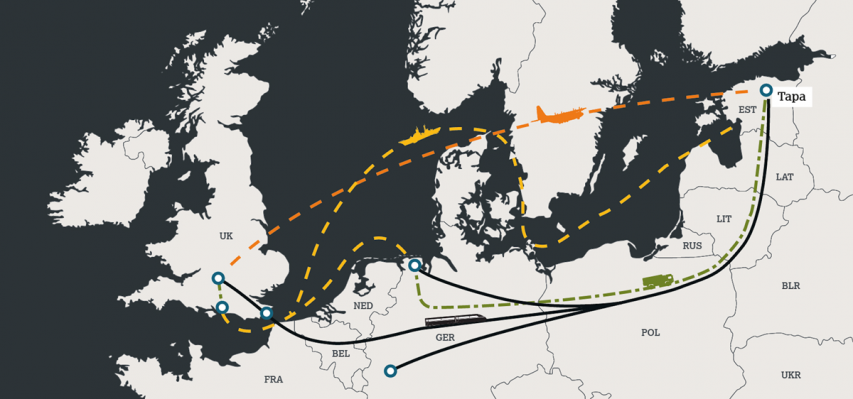Sir Humphrey discusses the ongoing commitment of nearly a thousand British soldiers to Estonia, and how the logistics to get them and their equipment there illustrates a rarely discussed but critical military capability:
One of the most significant exercise commitments this year has been the British Army and “Tractable” (sometimes referred to as either “Op” or “Exercise” but without a title on the British Army website. This major undertaking has been running for some weeks now and has highlighted how the British Army continues to excel at undertaking large scale movements of units in order to be ready to conduct operations as required.
The genesis of Tractable was the need to rotate assets out of Estonia and send new vehicles from the UK in their place. It is often overlooked that the UK now has over 900 British Army personnel permanently stationed in Estonia as part of wider NATO work to help send a strong signal to deter aggression from nations like Russia – which given its recent history of attacking and invading other countries and acting in a remarkably uncivilised manner is certainly required.
[…]
This may sound an obvious and straightforward thing to say, but investment in logistical tail is rarely something that features in many peoples “fantasy Army ORBAT” threads that litter the internet. Most people focus on combat power, looking at how many tanks or self propelled guns an Army has and then considering what this means for its combat power from there.
For the British Army, the investment in heavy armour, APCs and artillery is important, but equally so is the important in assets like logistics enablers – the ability to lift by train or sealift in order to actually get the Army where it needs to be, and not stuck somewhere irrelevant. The purpose of Tractable has as much been to test that the Army can still do this well, and that the various enablers work as intended to deliver a force that can fight.
In practical terms this has meant a focus on areas that often get relatively little attention. For example the skills required to pull vehicles out of storage, conduct road and rail moves across Europe and then deliver them to Estonia are complex and perishable. There is a lot of work required to ensure that a train can be safely loaded with the right armoured vehicles and then sent through the Channel Tunnel for onwards travel.
This work often puts significant responsibility in the hands of very junior soldiers who are responsible for ensuring that millions of pounds of equipment is safely handled and put in place properly. One slip up could have huge consequences and potentially cost lives as well. It is only by practising this activity regularly that it can be done safely and effectively for real though.
In the case of Tractable what it has demonstrated is the critical importance of the Royal Logistics Corp to the wider British Army. While logistics may not be a supremely “sexy” subject to many people, being able to ensure that the Army has the right equipment, people and training to be able to do this sort of work is essential – without it, things would rapidly grind to a halt.
Similarly, Tractable has helped focus attention on other critical capabilities like strategic sealift. The use of the “POINT” class strat ro-ro ferry force to help move vehicles across the channel and into Emden (and then onto Estonia) has helped show how key these vessels are to British Army capability. Without them it would be much harder to do the complex business of deploying overseas. Here too we are also reminded of the critical importance of units like 17 Port and Maritime Regiment, one of the most unusual (and vital) units in the Army today, responsible for co-ordinating the sealift and deployment of vehicles around the globe.





Thanks for sharing this – very interesting to see the bigger picture of the beans/bullets/hardware/folks getting to far-ish away places.
Comment by MILNEWS.ca — November 16, 2019 @ 12:01
Glad you liked it. I admit, I used to be one of the “fantasy army ORBAT” types, but as I’ve read more history, I now see that logistics issues — or the lack thereof — have probably decided more campaigns than a dozen Napoleons.
Comment by Nicholas — November 16, 2019 @ 12:41